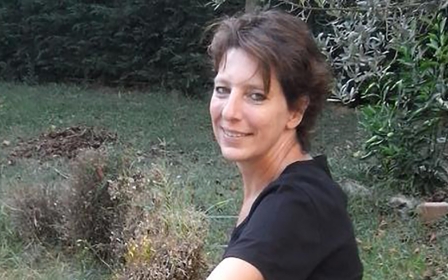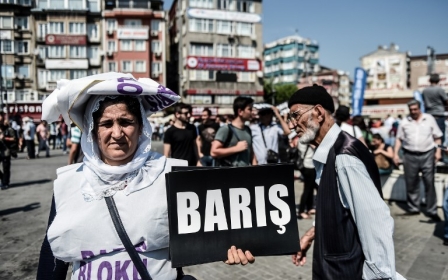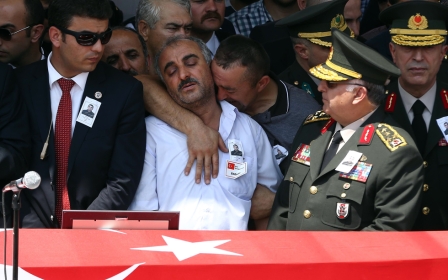Turkish army targets PKK after 16 soldiers killed in large attack

After a day-long silence over the toll, the Turkish army on Monday said the outlawed Kurdistan Workers Party (PKK) killed 16 of its soldiers in a roadside bomb attack on Sunday, one of the deadliest attacks carried out by the group.
Just hours after the attack, believed to be one of the largest carried out by the PKK since hostilities with the government resumed in July, the army said that it had retaliated by sending military planes to strike 13 PKK targets.
The army said that two F-4 and two F-16 fighter jets were deployed to carry out the strikes in a “heavy air campaign” and that many “terrorists” were killed, without giving a precise death toll.
“Despite very bad weather conditions, the operation continues decisively,” the statement added.
After a meeting with Turkey's top general Hulusi Akar in Ankara on Monday, Prime Minister Ahmet Davutoglu vowed that there would be no compromise with the PKK.
"These terrorists must be wiped out from the mountains; whatever happens they must be wiped out," Davutoglu said.
"The mountains of this country, the plains, highlands, cities, will be not abandoned to terrorists," he said.
It was not clear why it had taken the army a day to publish the toll and led to speculation earlier on Monday that the number was unusually high, or simply not known.
In addition to the 16 soldiers who were killed, six others were injured when the bomb went off in the Daglica area of Turkey's southeastern Hakkari region close to the northern Iraq border.
The PKK, known for sometimes exaggerating tolls of attacks on the security forces, said 31 Turkish soldiers had been killed in a combination of bombing and shooting attacks.
Davutoglu said the claims of a higher toll were part of a "psychological operation" aimed at "demoralising the nation".
"We must stand together against this black propaganda," he said.
The attack is one of the deadliest carried out by the PKK on the army in recent years. At least a dozen Turkish troops were killed in an October 2007 PKK attack also in Daglica, one of the most exposed and dangerous areas of the country.
"Turkey is in mourning," said the Turkish opposition paper, Hurriyet, which had been targeted by pro-government protests earlier in the day for its allegedly anti-government reporting. According to reports, some 150 supporters of the Justice and Development Party chanted against the newspaper and threw stones at its Istanbul headquarters.
President Recep Tayyib Erdogan said earlier on Monday that he was saddened by the attack.
“A mine attack has been staged. There will be a very particular and decisive fight there," he said in a live interview.
According to a statement published on the website of the PKK’s armed wing, the People’s Defence Forces (HPG), said the attack as an “act of sabotage”.
Hostilities flared up again this summer, leaving a 2013 ceasefire - aimed at assisting the search for a final peace deal to end the PKK's three-decade insurgency - in tatters.
Some 40,000 people are estimated to have died in the decades-long conflict.
The PKK initially took up arms in 1984 with the aim of establishing an independent state for Turkey's Kurdish minority, although latterly the demands focused on greater autonomy and rights.
The unrest comes at an explosive time in Turkey as the country prepares to hold snap elections on 1 November following June polls where the ruling Justice and Development Party (AKP) lost its overall majority.
According to Hurriyet, 70 members of the security forces have been killed since July in attacks blamed on the PKK, while state media have claimed that at least 967 PKK members have been killed in Turkish raids on PKK targets in Turkey and Iraq.
Middle East Eye propose une couverture et une analyse indépendantes et incomparables du Moyen-Orient, de l’Afrique du Nord et d’autres régions du monde. Pour en savoir plus sur la reprise de ce contenu et les frais qui s’appliquent, veuillez remplir ce formulaire [en anglais]. Pour en savoir plus sur MEE, cliquez ici [en anglais].





